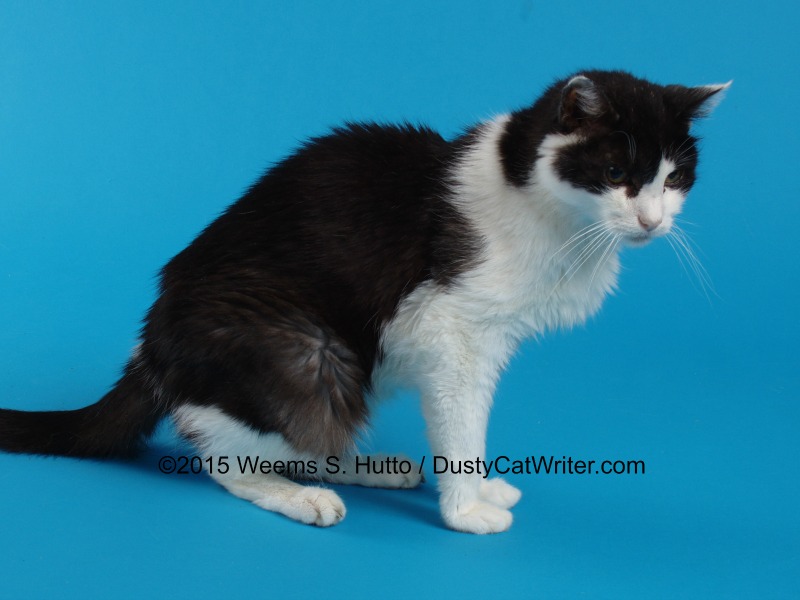
There’s nothing more heartbreaking than scanning the shelter to pull adoptable animals, only to find a gray-muzzled cat or dog looking up at you as if to say, “Where am I?”
To add insult to abandonment, a prospective family dashes right past him on the hunt for that perfect puppy or kitten. But wait, it’s worse. Today is euthanasia day. Without intervention, that once beloved pet will take his place in the statistic book next to five to seven million other animals who face euthanasia in shelters this year.
People pass up senior pets because of fear says Sherri Franklin, founder of Muttville, a San Francisco senior dog rescue. Muttville rescues and rehomes 350 to 400 seniors annually. Franklin says families fear losing their new pet soon after becoming attached. They’re also concerned about medical expenses they can’t afford. They’re not sure an old animal will bond with their kids, fit into the family, or the pet was abandoned because of bad behavior.
People surrender their golden oldies for many reasons most of which are not the pet’s fault):
- The elderly owner has died, gone into assisted living or moved in with a relative
- The family is moving to a place that doesn’t allow pets/the pet is over the weight limit
- They have too many pets
- Home foreclosure
- Allergies
- Spouse/S.O. doesn’t like cats/dogs
- New baby/pregnancy
- Kid is going off to college.
When you see those frightened, grizzled faces, don’t ignore them. With a little effort and a publicity campaign, you can make that cage space available to another homeless pet without a PTS order.

ADDRESSING OBJECTIONS TO ADOPTING A SEASONED PET
During the 1984 presidential debate with 56-year-old Walter Mondale, then 73-year old presidential candidate Ronald Reagan said, “I want you to know that also I will not make age an issue of this campaign. I am not going to exploit, for political purposes, my opponent’s youth and inexperience.” You need to look at adoptable senior pets with Reagan’s optimism.
“Look at why people are afraid to adopt a senior,” Franklin says. “Get rid of those fears.”
Remind mature potential adopters, especially senior citizens, “You aren’t past your prime, and neither are these animals.” Or “Just because you’re not a young pup doesn’t mean you don’t have a lot of life and love left in you. This cat (dog) is just like you.”
The most common objections to adopting senior pets include:
SHORT TIME REMAINING
While people fear the pet dying in just a few years, there’s no guarantee that any puppy or kitten will out survive a senior pet. Pets of any age can develop catastrophic medical conditions. Mary Hutto of Dallas adopted a healthy 8-week old Siamese-mix several years ago. Shortly after Spot turned a year old Mary discovered he suffered from hypertrophic cardiomyopathy. She lost him a few months later, but only after spending over $1000 on vets.
EXPENSIVE VET BILLS
There is no free pet. Even healthy puppies and kittens require a significant financial investment their first year. Adopters should expect to pay for vaccinations, lab tests, parasite treatments and preventatives, spay/neuter, obedience training, doggie daycare, grooming, food and miscellaneous stuff.
To allay health concerns, before placing senior pets up for adoption, Muttville performs health screenings including a full blood panel and heartworm check, and when needed, dentals and spay/neuters. Other shelters provide pet health insurance with the adoption.
“We’re taking the fear of unknown health problems out of the equation,” Franklin says. “We’re transparent. We tell you the dog has diabetes, and will need shots forever. Or it has dry eye.”
Muttville spends around $700 per dog, more than twice the adoption fee. They offset the difference with fundraisers. Muttville also provides a two-week trial period before finalizing the adoption to make sure the dog is a good fit for the family. “We will take back any dog,” Franklin says.
I WANT THE KIDS AND THE PET TO GROW UP TOGETHER
“The puppy or kitten stage goes by in the blink of the eye,” says Inga Fricke, director of sheltering and pet care issues at Humane Society of the United States (HSUS.) The kids won’t remember that puppy.” Instead they’ll look back with fondness at the romps in the park, games of tags and fashion shows involving baby doll dresses.
A senior pet with previous infant or toddler experience can tolerate (survive) a small child’s rough handling. A puppies or kitten risks injury or death if a toddler drops or falls on him. A kid-friendly older cat may tolerate the doll clothes dress phase embarrassment and grace, and escape to elevated furniture when she’s reached her BS (Baby Stuff) threshold. High energy and vulnerable kittens will struggle to get away from rough handling, so children may risk being bitten or scratched. Consequently, many shelters have 6-6 policies: homes with children under six years cannot adopt kittens or puppies under six months. If the animal’s history is known, shelter workers can tell potential adopters which senior pets came from families or foster families with kids.
Fricke says the even American Academy of Pediatrics discourages people with young children to have young pets in the home.
YOU can TEACH AN OLD DOG/CAT NEW TRICKS
Au contraire, adults have much longer attention spans, and that translates to learning faster. Besides, a mature pet already understands that there are house rules. He may not know the new rules, but since he knows what “no” means, he can certainly apply that to his current situation.
OTHER SENIOR PLUSES
Having a puppy or kitten is like having a human child,” Fricke says. “It’s the same effort going through those stages and training.”
SENIOR PETS ARE HOUSETRAINED
Housebreaking a puppy can take months (or much longer), and cost thousands in carpet cleaning or replaced flooring. Puppies must be taken outside to potty much more frequently than adults. Inga Fricke says, “The rule of thumb is that puppies can hold their bladders no more than one hour longer than their age in months. So, a two-month-old puppy can’t hold its bladder for more than three hours.”
Until they reach six or seven months, mishaps will occur if the puppy is crated or kept inside for long periods. Mature pets have the toilet issue down! Mature dogs understand that the house is not the bathroom.
OLDER PETS HAVE MANNERS
Senior dogs and cats take less work than little ones. They require little or no training. They already understand biting, jumping and scratching are off limits. They’ve moved beyond the destructive stage, thank goodness. With the teething stage and manic energy stages well behind the golden oldie, shoe chewing, drapes-climbing and furniture scratching will be minimal compared to puppies and kittens.
WHAT YOU SEE IS WHAT YOU GET
1960’s comedian Flip Wilson’s character Geraldine used to exclaim, “What you see is what you get!” That insightful phrase is the #1 selling point of senior pets.
Fricke says animals don’t develop their full personalities until they’re fully mature. “When you bring home that fluffy ball of fur you don’t know what you’re getting. If you’re looking at a pet who’s reached maturity, you know how active it’s going to be, if he’s nervous around strangers, if he’s outgoing or a hider.”
When the animal comes from the back of the cage to lick your hand, you know what you’re taking home. “There’s no guarantee that energetic kitten will mellow out when he’s grown,” she says.
Apartment dwellers who have pet weight restrictions benefit from senior adoption because they don’t have to worry about that cute puppy with the delicate paws unexpectedly growing into a behemoth. And once again, seniors are less destructive and potty trained.
STRATEGIES FOR SENIOR PET ADOPTIONS
“Finding homes for seniors is a challenge,” Fricke admits. “Combine good marketing with education by informing the public about the benefits of older animals, as well as the pitfalls of bringing home younger animals. It’s still always going to be a challenge, unfortunately.”
Get creative in your marketing. Sherri Franklin says Muttville volunteers post pictures and the dogs’ stories on Facebook, Twitter, Petfinder.com, Adoptapet.com and even Craig’s list. Create a brochure or flyer spotlighting the advantages of adopting mature pets. Don’t forget to feature adoptable seniors in both your email and snail mail newsletters and even send out short e-news blasts with the pet’s story. A touching mailer can also become a powerful fundraising tool.
Fricke says shelters frequently create interest in older pets by placing them in prominent places on their web site. Consider reducing adoption fees on animals one year and older. She encourages people to check out shelterpetproject.org, the pet project cooperation between HSUS, Maddie’s Fund and the Ad Council.
WORDS MEAN THINGS
William Shakespeare brilliantly wrote, “What’s in a name? That which we call a rose by any other name would smell as sweet.” And while there’s nothing sweeter than an old cat or dog, potential adopters don’t respond well to the word “old.” When talking about or describing an available senior, Franklin suggested using more positive synonyms. Try “mature”, “senior”, “gentleman”, “mature lady”, “tried and true”, “sweet senior”, “mellow”, “couch potato”, “friend”, “grandma”, “grandpa”, or “golden oldie”.
IN YOUR FACE
Fricke says shelters should do anything they can do to spotlight how well these animals would fit into the home.
Position senior cages so prospective adopters must view the classic models before they can see the puppies and kittens. Some shelters bring the seniors, or hard-to-adopt animals, into the lobby to work as greeters. When families see a Lab sleeping on a bed, they think he’s a well-behaved dog compared to the hooligans in the back jumping up and barking. Stress the advantages of mature cats and dogs and how they will complete the family.
FREEBIES
Besides reduced or waived fees, Fricke says some shelters provide free care packages or start up kits for adopters of senior pets that include: collars, leashes, bowls, toys, litter boxes and scoops. Future vaccinations, vet care, free behavior advice or training may also pique interest in older shelter dwellers.
WARM FEELINGS
And let’s not discount those warm, fuzzy feelings people get from saving a life and doing a good deed. Adopting an aging pet makes a statement about the adopter’s compassion. It says he or she values every stage of life.
Sherri Franklin says “Don’t hesitate to use the pet’s story to tug at people’s hearts. It’s all about selling the pet, and telling his story in a compelling way, whether it’s happy or sad.” Some people respond to happy stories, others want to make up for an animal’s difficult life.
COMFORT AFTER LOSING A PET
People grieving from the recent loss of a pet may receive great comfort if they can save another life as a result of their tragedy. There’s no question, adopting a senior pet is saving a life.
WE DELIVER FOR YOU
-If your senior pets aren’t showing well with all the competition in shelter, find a unique adopt-a-pet location and let them shine. Hold an event in a seniors community.
WHO ADOPTS SENIORS?
Senior citizens and childfree couples are the most likely demographics to adopt aging pets because the animals are less demanding and more laid back. So consider implementing a program that targets these groups.
SENIORS FOR SENIORS
A growing number of shelters offer senior pets for a greatly reduced adoption fee (or waives fees entirely) to senior citizens in Seniors for Seniors programs. <<<Link to the Seniors for Seniors article.>>> Others provide the same option to any interested adopter.
Using some imagination and a lot of marketing, any group should be able to increase senior adoptions and prevent unnecessary adoptions.









